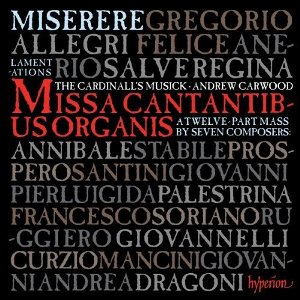Farnaby's Dreame: 20 pieces from the Fitzwilliam Virginal Book
Originally published on musicalcriticim.com
22 Feb 2009
We are indeed fortunate that The Fitzwilliam Virginal Book survives since it contains a host of musical treasures, a substantial amount of which have yet to be found elsewhere.
This manuscript was thought for a long time to be the work of Francis Tregian, an imprisoned recusant Catholic, however, recent handwriting analysis suggests it is the work of many copyists, probably professional. Had it not survived at all then we would have precious little music by Giles Farnaby as these twenty pieces saved from oblivion by just one source represent almost half of his surviving output.
This delightful album, recorded in 2003 by the early keyboard specialist Timothy Roberts, is a wonderful example of how solid research and keen musicianship can be wed to form insightful performances. Roberts is a major performer with the Gabrieli Consort and director of His Majestys Sagbutts and Cornetts to name just two of his ventures. His blend of research and passion comes across just as loud and clear in the accompanying notes as it does in the recorded performances. Farnaby is an interesting choice for an album; indeed, since the manuscript that bequeaths these pieces to us is riddled with points that are far from clear it takes a performer of Roberts' stature to tackle the necessary speculation that inevitably arises.
Often overlooked as a minor composer and overshadowed by the exceptional works of Byrd and Gibbons his pieces are actually rather revealing in their rustic quality. The music, often dashing and improvisatory in feel is vivid and immediate and I feel that Farnaby nods towards both Byrd and Italian composers when at moments his music gets quite funky.
Throughout this recording Roberts displays a keen but graceful sense of rhythm which, in my opinion, is absolutely essential when negotiating the divisions and the longer pieces such as the Fantasia (Fitzwilliam Virginal Book no 233).
The instrument itself is also a contributory factor to the sense of excitement of this disc. A copy by Malcolm Rose of a 1579 London-made harpsichord, it has a really sprightly tone that allows for clarity in even Roberts' most astonishingly deft passagework. This responsiveness brings a lot of the music to life but most striking of all is the sweet-and-sour zing in the tuning. At a quarter-coma mean tone there are some fantastic textures as the music runs through scale-like passages, often making sense of what would otherwise have been indifferent harmonic progressions. Tuning systems like this only highlight how accustomed many of us are to the prosaic qualities of equal temperament and how refreshing it is to step away from that domination from time-to-time.
This is really one of the best albums of its kind and well worth getting to know. The music may not be as ravishing as Byrd but it is energetic and exciting. Farnaby is a minor-composer well worth the effort. More like this please.
Timothy Roberts, Harpsichord (Early-music: EMCCD7756)
22 Feb 2009
We are indeed fortunate that The Fitzwilliam Virginal Book survives since it contains a host of musical treasures, a substantial amount of which have yet to be found elsewhere.
This manuscript was thought for a long time to be the work of Francis Tregian, an imprisoned recusant Catholic, however, recent handwriting analysis suggests it is the work of many copyists, probably professional. Had it not survived at all then we would have precious little music by Giles Farnaby as these twenty pieces saved from oblivion by just one source represent almost half of his surviving output.
This delightful album, recorded in 2003 by the early keyboard specialist Timothy Roberts, is a wonderful example of how solid research and keen musicianship can be wed to form insightful performances. Roberts is a major performer with the Gabrieli Consort and director of His Majestys Sagbutts and Cornetts to name just two of his ventures. His blend of research and passion comes across just as loud and clear in the accompanying notes as it does in the recorded performances. Farnaby is an interesting choice for an album; indeed, since the manuscript that bequeaths these pieces to us is riddled with points that are far from clear it takes a performer of Roberts' stature to tackle the necessary speculation that inevitably arises.
Often overlooked as a minor composer and overshadowed by the exceptional works of Byrd and Gibbons his pieces are actually rather revealing in their rustic quality. The music, often dashing and improvisatory in feel is vivid and immediate and I feel that Farnaby nods towards both Byrd and Italian composers when at moments his music gets quite funky.
Throughout this recording Roberts displays a keen but graceful sense of rhythm which, in my opinion, is absolutely essential when negotiating the divisions and the longer pieces such as the Fantasia (Fitzwilliam Virginal Book no 233).
The instrument itself is also a contributory factor to the sense of excitement of this disc. A copy by Malcolm Rose of a 1579 London-made harpsichord, it has a really sprightly tone that allows for clarity in even Roberts' most astonishingly deft passagework. This responsiveness brings a lot of the music to life but most striking of all is the sweet-and-sour zing in the tuning. At a quarter-coma mean tone there are some fantastic textures as the music runs through scale-like passages, often making sense of what would otherwise have been indifferent harmonic progressions. Tuning systems like this only highlight how accustomed many of us are to the prosaic qualities of equal temperament and how refreshing it is to step away from that domination from time-to-time.
This is really one of the best albums of its kind and well worth getting to know. The music may not be as ravishing as Byrd but it is energetic and exciting. Farnaby is a minor-composer well worth the effort. More like this please.
Timothy Roberts, Harpsichord (Early-music: EMCCD7756)



Comments
Post a Comment